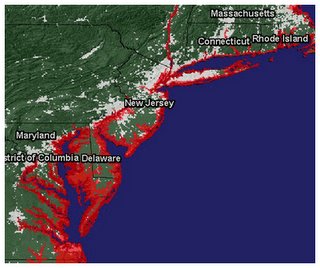If our climate continues to warm at the current rate, then many of the world's coastlines as we know them today will be under water by the year 2100. Sea levels could rise by 2-3 feet. The map below (taken from cnn.com) shows the projected impact on the region where I live. My house is situated firmly in the red zone.

In fact, my home is situated far enough into the red zone to make me wonder if it will take a full century for me to feel the effects of global climate change. After all, it cannot be expected that the seas will suddenly rise by 24" exactly 100 years from today. A gradual rise is the more likely scenario, and it has already begun. The polar ice caps and mountain glaciers of the world are disappearing at an alarming rate. As the icefields (which reflect sunlight out of the atmosphere) dissipate, we absorb even more solar energy, increasing the rate of warming. The oceans absorb heat. As the oceans grow in size due to the melting icefields, we absorb more heat. Quite a cascade.
So I wonder, what will I see in my lifetime? If I stay in New Jersey, in my present home, what will I see through my back window? Whenever we have heavy rain, or a coastal storm threatens, those of us who live on the southern New Jersey mainland (the oceanside beaches of South Jersey are located on barrier islands, not on the mainland) joke about having beachfront property when "the big one" hits. Is there more truth in that old joke than we want to acknowledge? Will the woodland that is my back yard die off as salt water seeps upward, killing first the easternmost trees, and gradually creeping up on my home?
I've heard two different versions of the ultimate impact of global warming on climate in the future. Both seem to agree that the temperatures we experience will be extreme. It will either be brutally hot or the Gulf Stream will shift, ushering in an ice age. Robert Frost offers the best summary of my feelings about the possibilities:
Fire and Ice
Some say the world will end in fire,
Some say in ice.
From what I've tasted of desire
I hold with those who favor fire.
But if it had to perish twice,
I think I know enough of hate
To say that for destruction ice
Is also great
And would suffice.
6 comments:
Merci,
I figure at this rate, we could move to Cherry Hill and have beach-front homes!
Pax,
Cherry Hill is already out of my budget. Make it beachfront, and ouch!
Sounds like a science fair project to me!
i guess any cruise ship we board in our retirement may be sailing on our property after all.
Is this all due to the ozone layer or other mitigating factors?
Virginia Gal-
Good idea! Too bad I don't have kids - I'd share the idea.
Joe-
Global warming and the disappearing ozone layer seem to be behind the extremes of climate change.
my question is better asked, is the ozone layer the culprit for global warming?
Post a Comment